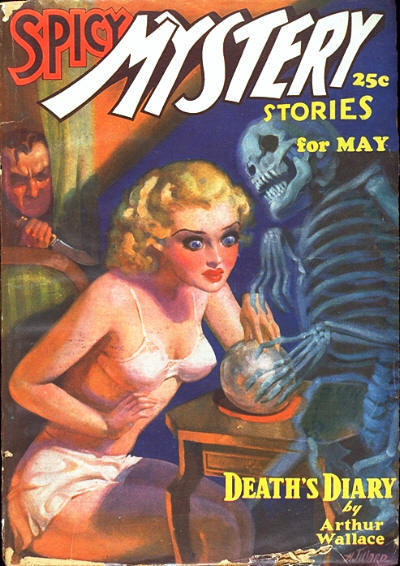
Friday, December 26, 2008
With Malice Toward None

Thursday, December 25, 2008
Terra Cognita

Wednesday, December 24, 2008
Wonder Women
My favorite post of the week is Providentia's concise review of the strange life and career of William Moulton Marston: psychologist, inventor of the polygraph, creator of Wonder Woman (in 1941), and, it must be said, distinctly unconventional family man. Thank you, Marston, but not for the polygraph, which hasn't stood up very well scientifically.
And today I can't resist this towering Emily Dickinson lyric, in a boreal and reverent mood:
My period had come for Prayer --
No other Art -- would do --
My Tactics missed a rudiment --
Creator -- Was it you?
God grows above -- so those who pray
Horizons -- must ascend --
And so I stepped upon the North
To see this Curious Friend --
His House was not -- no sign had He --
By Chimney -- nor by Door
Could I infer his Residence --
Vast Prairies of Air
Unbroken by a Settler --
Were all that I could see --
Infinitude -- Had'st Thou no Face
That I might look on Thee?
The Silence condescended --
Creation stopped -- for Me --
But awed beyond my errand --
I worshipped -- did not "pray" --
The rest is silence...until the next post.
Happy Holidays.
Tuesday, December 23, 2008
That is the Question

Monday, December 22, 2008
'Tis the Season

Sunday, December 21, 2008
(Not) Just Another Day at the Office (continued)
That often madness hits on, which reason and sanity
Could not so prosperously be delivered of.
Polonius
A young fellow comes in, for a routine check-in after hospital discharge. He has been diagnosed with schizophrenia, although he disputes that (surprise). But he protests that what he really needs is not "pills," but rather housing and a job. "All you all ever talk about is pills...always more pills...what am I supposed to leave my kids, a bunch of pills?"
Good question. Fortunately his community support worker is sitting in with us; hopefully she has all kinds of great ideas for him. His last job was $7 an hour at Biscuitville, and with gas prices being what they were then, what was the point, really? The Obama campaign/transition team keeps sending me emails--what are they going to do for him?
Another guy, middle-aged this time. It sounds like he was quite successful, with a high-paying sales job and a family until he developed a severe psychotic disorder several years ago. Since then it has been steeply downhill, with several hospitalizations, disability, and divorce.
I had first met him a few weeks ago, when his family brought him in in a floridly psychotic state. At that time he was disheveled, paranoid, and exhibited thought-blocking. This time it is after his discharge and I barely recognize him. To be sure, his appearance is subtly off: a few hairs out of place, and a jacket that is a bit too long and too bright. But he is making an effort, and arrives early for his appointment.
He has been put on prodigious amounts of haloperidol, both oral and by long-acting injection, but he tolerates it without complaint. His chief concern seems to be a compound of loneliness and futility. He is heartbroken over not having seen his kids for months, and his ex-wife seems to have been able to deny him access. He wants to look into working and being productive again, like he used to be. Yet he sheepishly allows glimpses of persisting delusional systems. I don't think he could or should hold a regular job at this point. He lives alone, but does attend a church, and has some support from his family of origin. He has lost almost everything.
Why?
Friday, December 19, 2008
Married With Children
We had a "computer guy" come over and "clean up" our computer because it appeared to have some viruses. The rather detached and deadpan fellow arrived and sat down in front of the device. Not long after he asked, "Do you have any alcohol?"
This seemed a little bit unusual, so my wife asked, half-jokingly, "Do you need a drink?" Maybe our computer viruses were more serious than we thought, or maybe this was a different kind of "computer guy" than we were used to.
"Rubbing alcohol," he corrected. It was duly obtained, and he went to work with it, removing, of course, some old peanut butter and assorted bits of "sticky stuff" adorning the mouse and keyboard (hadn't even noticed). So we got computer maintenance and detailing as well. He charged extra to detail the children though, so that will have to wait. (We're not dirty people, really, I think he must have been on the fastidious side--not that there's anything wrong with that).
Note to self: no more late-night PB & J while blogging.
Thursday, December 18, 2008
Blog in a Bottle
Perhaps the first question the blogger has to ask is: Am I writing for myself or for others? However much one might claim the former ("I don't really care if anyone reads it"), we know it's bogus. If it were for oneself it would be in a journal stashed in the closet and not on the Internet. Even the radically reticent Emily Dickinson (at least where actual publication was concerned), did not after all burn her poems, and presumably died hoping against hope that someone would discover them--and her.
Of course, writing within view of others, so to speak, is not at all the same as writing for others. Most bloggers, I think, have the attitude of "I'm pretty much writing for myself over here, but if you want to come look no one's going to stop you."
Even in relatively formal blogs comprising amateur reportage, commentary, or professional insights there is embodied an aspiration to be found of interest--not to six billion obviously, and indeed six might suffice. Don't all human beings secretly fantasize that their deepest speculations might be widely found to be somehow remarkable? Don't we all wish at some level to be the writer, thinker, or even celebrity whose hidden journals, once found, are a source of endless intrigue? Well, maybe it's just my own narcissism ("Physician, heal thyself").
I am a devotee of the wide angle lens, of the aerial shot showing the interconnectedness of things, and of the ephemeral that is all the more valued for being so. It is in my nature to take things in in a glance as it were and move on. I don't say it's the best, indeed it likely is not, but it's the way I think and see.
Blogging can obviously be time-consuming. A major decision is whether to write only when one really feels some compelling pressure to express something (um, in a literary way I mean), or whether one ought to get something down every day even if it means a pedestrian post or two (or more). Some days one looks at the screen and thinks, "I got nothin' here."
So as a metaphor I'm sure others have probably used countless times already, a blog seems to me the cyber version of the message in the a bottle, sent out in a second rather than over a few years, but still providing one with the fantasy of achieving an unexpected connection. Human beings have a way of needing to project themselves across space and time.
So if anyone has any comments about what is useful or interesting in this or any blog I'd be happy to see them. Remarks such as "More interesting posts please" or "Okay, you can stop now," while understandable, might be best directed to my email. If you made it this far--thanks for reading!
Who's Afraid of the DSM?

An unhappy people in a happy world --
Read, rabbi, the phases of this difference
An unhappy people in an unhappy world
Here are too many mirrors for misery
A happy people in an unhappy world --
It cannot be. There's nothing there to roll
On the expressive tongue, the finding fang.
A happy people in a happy world --
Buffo! A ball, an opera, a bar.
Wallace Stevens
I'm sure we'll be hearing a lot about psychiatry's Diagnostic and Statistical Manual in coming years, with the fifth edition due out around 2011. For some of us, diagnostic issues, like politics did around 2006, is about to get a lot more interesting. The New York Times has an article today on how things are coming along (without a single bone of contention, rest assured).
There are some misunderstandings about the infamous tome. As is widely noted, the number of official "mental disorders" has increased significantly with every edition of the book, to nearly 300 today. But many of these are minute variations of the same basic problems. For instance, Alcohol Abuse is a distinct diagnosis from Alcohol Dependence, but both are just degrees of severity of the same addiction.
Wednesday, December 17, 2008
Bedlam
Tuesday, December 16, 2008
Strung Out

Monday, December 15, 2008
Future Shock

Sunday, December 14, 2008
Archimboldi

Friday, December 12, 2008
Noises in the Attic

Alas, how is't with you,
That you do bend your eye on vacancy,
And with th'incorporeal air do hold discourse?
Gertrude
(Illustration by Adolf Wolfli, hospitalized for psychosis in Berne, Switzerland from 1895 until his death in 1930).
Auditory hallucinations are the darndest thing. We all have our moments in life obviously, and I think that my own experiences plus a willing imagination can provide at least a vague idea of what it might be like to undergo a good number of the clinical syndromes I see. Can I know exactly? Of course not, as some patients like to point out, but that is always the case between two people (can they know exactly what it is like to be me?). Like any decent doctor or therapist, I make the effort and continually check in with the person in question to see how my imagined approximation is holding up.
Voices are tough though, as I have never experienced anything like them. The ominous creak upstairs, the pillow in the dark mistaken for something else, yes, but voices are something else entirely. I doubt that dreams provide any semblance of waking hallucinations. I can only imagine that they are disturbing at the least and potentially terrifying. My lack of experience makes me all the more curious about what it might be like to have them, so I hope that imagination gives empathy a needed boost.
Voices are most commonly associated with schizophrenia, but they constitute psychotic symptoms that may occur in various other conditions: severe depression or mania, substance abuse or withdrawal, and various neurological disorders such as dementia and delirium. Visual hallucinations can occur along with voices, but the former are more commonly seen in "organic" conditions such as substance withdrawal and delirium. Atypical voices can occur with borderline personality disorder or post-traumatic stress disorder. Not long ago I saw someone with voices that, she volunteered, had names. This is unusual, and given her history of severe abuse, it may suggest dissociative identity disorder (the same as "multiple personality disorder").
If someone hears the voice of a loved one who has died, this is considered normal. Similarly, hearing the voice of God is normal if such is culturally appropriate for the person and not accompanied by psychopathology. It is also possible, although perhaps rare and certainly not well understood, for some people to have random and isolated auditory hallucinations without having a psychiatric or neurologic condition.
Like much in psychiatry, the heterogeneity of auditory hallucinations is impressive. Most commonly they are strange (i.e. not sounding like anyone known to the patient) and derogatory. That is, they utter insults, often using profanity. Somewhat less commonly, they issue commands, sometimes bizarre and sometimes threatening.
But auditory hallucinations can be quite subtle, and in those cases it is hard to know how aggressively to go after them (particularly when they aren't obviously distressing to the patient). Someone may hear faint voices but be unable to make out what they are saying (this is often described as hearing a barely audible conversation in an adjoining room). They may hear noises that don't seem "real" (i.e. generated by the physical environment) but that aren't voices. Some people hear music; this seems to occur with the elderly more often. Some of this may be more likely with the relative sensory deprivation of hearing loss.
When it comes to true schizophrenia, there is nothing quite like seeing someone in the grip of a first psychotic break, or in the months thereafter. There is a distinct air of dismay, bewilderment, and consternation. The patient appears at once puzzled, confused, and afraid. I am often surprised that patients and their families are not particularly focused on the diagnosis--it is as if they know already at some level. I give it to them anyway as gently as I can (or remind them as the case may be) and emphasize manageability of symptoms with treatment.
The psychotherapy of psychosis involves education and intentional self-distraction among other things. People in the grip of voices sometimes wander long distances away from home, as if they are being hounded. It takes them a while to learn and to believe that they don't have to listen to the voices, that the voices, despite their threats, are actually powerless to hurt them or anyone else. People who have lived with schizophrenia for years become relatively accustomed to voices, although they can obviously still be upset and agitated by an exacerbation.
While recent studies have suggested that older antipsychotic drugs (like haloperidol (Haldol)) are every bit as good as newer ones, in my experience the newer ones are better tolerated in a subjective sense. Patients are more willing to take them. The metabolic side effects (weight gain and diabetes) can be a major problem.
In the ten years since residency I have never accepted drug company gifts or support of any kind. So my drug preferences are based on what I read in the literature and my experience with patients. Risperidone (Risperdal) is my favorite antipsychotic to start with; it seems to balance solid effectiveness with good tolerability. I found out the other day that 30 doses of generic risperidone 3 mg was only $46; I was surprised, that almost approaches affordability.
Olanzapine (Zyprexa) has the worst metabolic side effects on average, but its efficacy is impressive; it is often a reasonable option for those having major insomnia and who are thin (to start with). Unfortunately it is exorbitantly pricy. Quetiapine (Seroquel) is well-tolerated, but as it too can cause weight gain (and is very expensive too), so is often prescribed too loosely for insomnia and anxiety (in the absence of psychosis). Aripiprazole (Abilify) is a decent alternative because it produces less drowsiness and weight gain, but not uncommonly it generates unpleasant akathisia (a restless feeling).
The other day at our small clinic 37 patients received their monthly or bimonthly antipsychotic injections (they are for people who cannot or will not keep up with taking pills daily, but these kinds of shots are voluntary). I heard that Risperdal Consta now comes with a smaller needle for deltoid rather than gluteal use; I suppose that is an improvement. I imagine it must hurt though.
Thursday, December 11, 2008
Grand Inquisitor

Wednesday, December 10, 2008
Where Liberals Lurk

Tuesday, December 9, 2008
Happy Happy, Joy Joy

Sunday, December 7, 2008
The Year in Music

Saturday, December 6, 2008
Spicy Southern Gothic
 (No, not that spicy; this is a wholesome blog).
(No, not that spicy; this is a wholesome blog).Thursday, December 4, 2008
Feline Farce
Wednesday, December 3, 2008
On Psychiatric Overdiagnosis
Psychiatrists seem to have the idea that they are the ultimate arbiters of diagnosis. They aren't; the society in which they practice is. Now, psychiatrists do have more expertise than the average person on the street when it comes to mental functioning, but some wisdom is not the same as omniscience. The psychiatric profession--explicitly via the DSM, implicitly via aggregrated clinical habits--submits proposals as to what should constitute mental disorder. However, it is the society at large, contingent upon public attitudes and financial resources, that ultimately decides what the purview of psychiatry will be.
The analogy that comes to mind is the distinction between military tactics and defense policy. As the famous quote goes, war is too important to trust to the generals. In the case of democracy at least, a society decides (by virtue of the government it elects) the general kind of defense policy it will pursue. The military is entrusted with the mission of carrying out those military goals. But the military does not set defense policy--in a democracy at least. To be sure, military personnel have opinions about defense matters that, due to their expertise, should be given particular attention, but they do not have the final say.
To stretch the metaphor to a breaking point, the problem is that the "war on mental illness" (would that be like the "war on drugs" or the "war on terror?") is not a coordinated campaign, but rather comprises endlessly complicated guerrilla tactics carried on in many thousands of consulting rooms. Psychiatrists have their "marching orders," a plan of what is to be accomplished and what is or is not appropriate in carrying out that plan, in the form of, say, FDA recommendations, the DSM, and the nebulous concept of "standard of care," but due to professional privilege it is easy for psychiatrists to become vigilantes. They become so sure of their power and, granted, so honestly aggressive toward "the enemy" (mental disorder, recall, not the patient), that they exceed appropriate bounds. When psychiatrists try to be Batman, things go awry.
When a soldier or even a general becomes insubordinate or even undermines the mission in subtler ways, he can be removed. When individual psychiatrists commit malpractice, of course, they can be removed in a way too. But there is no easy feedback system for influencing the profession as a whole when it has strayed too far. Economics can accomplish this, and did so when society essentially decided that it could not pay for long-term psychoanalysis for anyone who wanted it.
Psychiatry, like the Republican Party, may be venturing farther into the wilderness. Criticism of diagnostic and prescribing trends, along with high-profile pharma cases rocking academic psychiatry, has put the profession out of step with "mainstream America." Psychiatry needs to understand that while people at all ages have varying degrees of mood instability and impulse control, not everyone wants to classify these differences along a diagnostic spectrum. People want to have the freedom to be odd or even imprudent even if it may do them harm; they want the freedom to screw up without having to see a psychiatrist. Lack of "awareness" and "access" can be real issues, but when psychiatrists focus on them excessively they can lose sight of the fact that some people just do not desire their services. Psychiatry seems to think, "If only they knew us better, they would like us--what's not to like?" Hmm.
For the foreseeable future there will be enough truly unambiguous psychopathology to keep the profession plenty busy without having to go stir up diagnoses. None of what I've written is meant to romanticize very real depression, bipolar disorder, schizophrenia, and yes, personality disorder and substance abuse, for which psychiatry is alas, quite necessary. But overall mainstream psychiatry is looking a lot like the party of Delay, Bush, McCain, and Palin. Let's see, whom else can I offend?
Tuesday, December 2, 2008
Lugubrious Lucubrations

If you're down he'll pick you up, Doctor Robert
Take a drink from his special cup, Doctor Robert
Doctor Robert, he's a man you must believe,
Helping everyone in need
No one can succeed like Doctor Robert.
Lennon/McCartney
Psychiatry is mostly unlike the rest of medicine, for better and worse, but it seems to me it has some things in common with my (admittedly distant) understanding of what a pain specialist does. If any of the latter happen to read this, set me straight.
1. Mental disorders, like pain syndromes, are often correlated with objective factors, but they are nonetheless fundamentally subjective and therefore frequently misunderstood and vulnerable to stigma. Diagnosis is therefore ambiguous and liable to being contested.
2. Both mental disorders and pain syndromes may get better with the mere passage of time. Watchful waiting is always an option.
3. Conservative treatment methods (psychotherapy/physical therapy) should be considered first.
4. Both mental and pain disorders are at risk of settling into chronic pernicious syndromes (often in a mutually reinforcing way).
5. Medication treatments in both carry the risk of addiction, sometimes iatrogenic. This can create tension in the clinical relationship.
6. In both psychiatry and pain medicine, simple cases are rare because primary care physicians have already taken care of most of those.
7. Both mental and physical distress are sensitive to suggestion and placebo (or nocebo) effect, both cultural and medical.
8. The treatments are broad in their effects and not specifically pegged to diagnosis; therapy is therefore more empirical and pragmatic than theoretical.
9. The aim is not cure, but rather symptomatic management either indefinitely or until the episode gets better on its own.
10. Both physical pain and emotional distress, beyond a certain point, threaten to become all-encompassing and to monopolize consciousness.
11. Both physical and emotional pain are necessary and at times even advantageous, but one can have too much of a good thing.
12. People may be growing less stoic, more sensitive to both physical and emotional distress in contemporary culture. There is a straight line between aspirin and Prozac.
Cool (or at least cooler than we thought)
